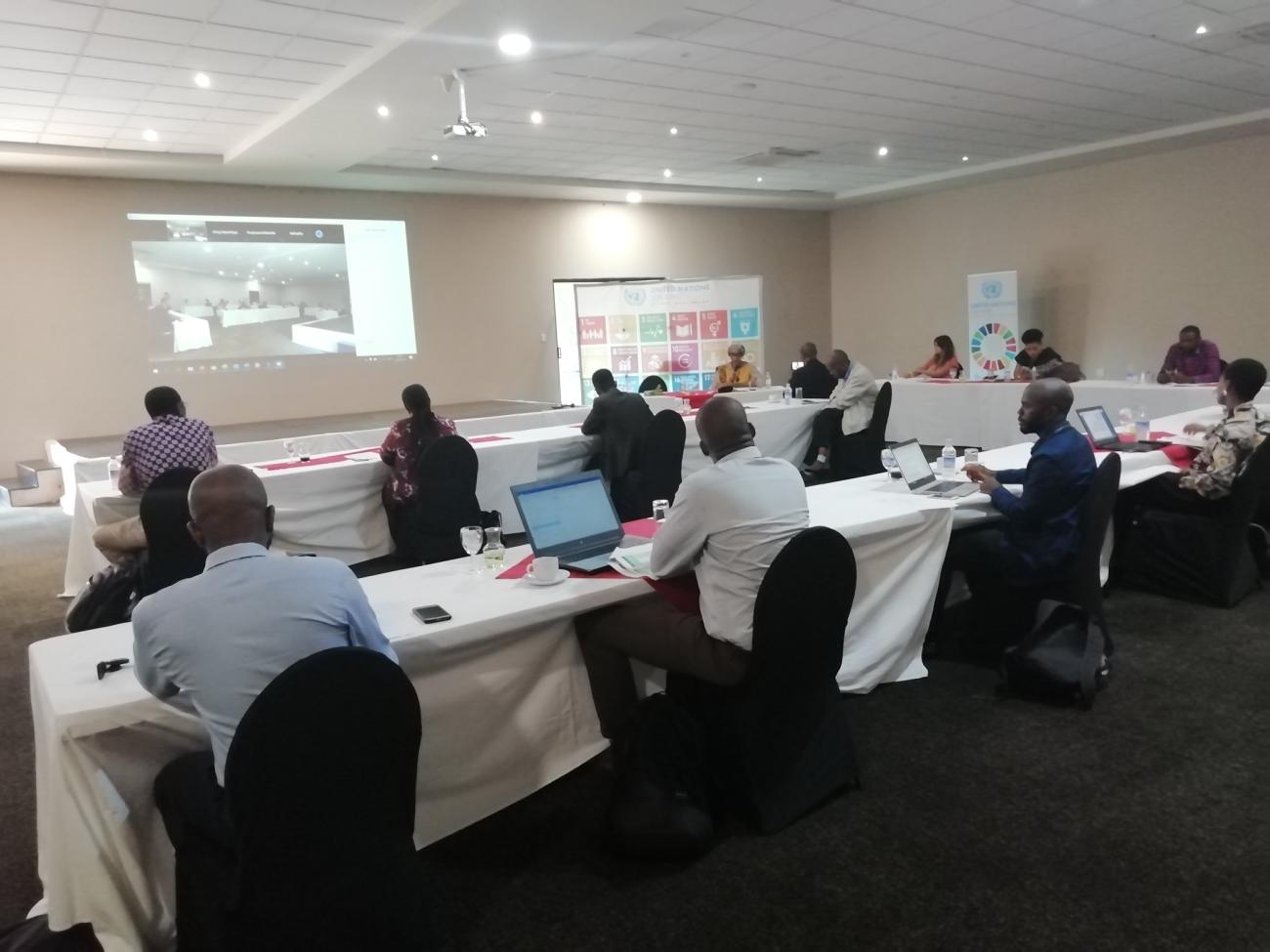The United Nations and the National Disaster Management Agency (NDMA) held a Humanitarian Partners Meeting on Eswatini’s COVID-19 Humanitarian Response Planning. The meeting aimed to bring together various humanitarian actors to prioritise the interests of Eswatini’s most vulnerable people and ensure that no one is left behind in the country's response to COVID-19.
The UN Resident Coordinator. Ms. Nathalie-Ndongo Seh, opened the meeting and welcomed all in attendance, saying; “I welcome you to this important gathering aimed at developing a collective, integrated and coherent Humanitarian Response to COVID-19 national strategy, plans and efforts in the Kingdom of Eswatini. The world faces an unprecedented threat from COVID-19. We shall get through this crisis only if we act together, in solidarity, in a strategic and very decisive manner, as the circumstances on the ground may allow us to proceed.”
She continued to highlight the vast challenges that at risk populations face during the COVID-19 outbreak and asked that every humanitarian partner combine resources to elevate and respond to these issues; “I wish us great success in our deliberations today. I am confident that, by the end of the meeting, we will all have a common understanding of the risks and vulnerabilities stemming from COVID-19 in Eswatini and will build the necessary mechanisms for joint work in response to the humanitarian impacts of the pandemic.”
A situation analysis was given by the Ministry of Health and Dr Kevin, WHO Representative, which highlighted the number of confirmed cases in the country and the severity of each case. It was reported that to date, Eswatini has 15 confirmed cases and of the 15, only one case has been severe. It was highlighted that Eswatini has started seeing local transmission of COVID-19, as more people with lack of travel history are getting infected. Eswatini now has a local COVID-19 testing facility which will be able to do 60-100 tests per day.
NDMA presented on what is currently being done in Eswatini to combat the spread of COVID-19, which includes but is not limited to: on the ground distribution of masks to municipalities and the health sector, water tanks being distributed to various constituencies to facilitate safe and clean hand-washing, distribution of government vehicles to ensure testing and contact-tracing of patients is carried out and the deployment of armed forces to borders and main city bus ranks to ensure the sanitization of facilities and limited operation hours are adhered to, as stipulated in the partial lock-down guidelines.
Different humanitarian clusters were asked to briefly report on their risk assessment, programmes and proposed initiatives. Clusters included; social protection, education, agriculture, food security and nutrition, water and sanitation, logistics and transport, health, environment and energy, and information and communications technology. Children, youth, people with disabilities, elderly and pregnant women were some of the vulnerable groups discussed in depth by the various clusters. Prominent issues that emerged during discussions were: an increase in Gender-Based Violence (GBC), the various barriers faced by persons living with disabilities, safety of learners, the continuity of teaching and learning and food security in Eswatini, during the outbreak.
Training of front-line responders, establishing a protection desk within the national emergency command centre for vulnerable populations, radio and tv programmes that will assist students learning at home, winter cropping to increase the availability of grain and vegetable crops, deployment of regional transport officers to ensure that everyone is provided transport, and procurement of therapeutic products to support cases of malnutrition were some of the initiatives that were proposed during the meeting, with with many already being under-taken.
To close the meeting, Ms Nathalie Ndongo-Seh stated that she was impressed with the integration of the clusters and how they seemed to be mobilizing every resource that they had towards the one shared vision of coming out of this crisis without leaving anyone behind. She thanked all the partners for their contribution during this two-day meeting: “While addressing the everyday emergent challenges and needs, we shall remember to set the stage for a recovery that builds a more sustainable, inclusive and equitable economy, guided by our shared promise — the 2030 Agenda for Sustainable Development – driven by the Five Ps: People, Planet, Peace, Prosperity and Partnerships. These principles are even more relevant and more critical in our efforts to address the global crisis brought by COVID-19.”
Please follow this link for a video clip of the UN Resident Coordinator's statement: https://eswatini.un.org/en/41080-humanitarian-partners-meeting-covid-19-response-planning


















